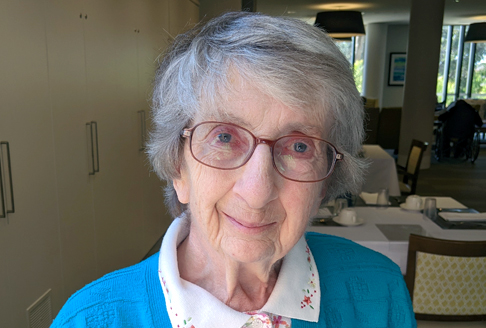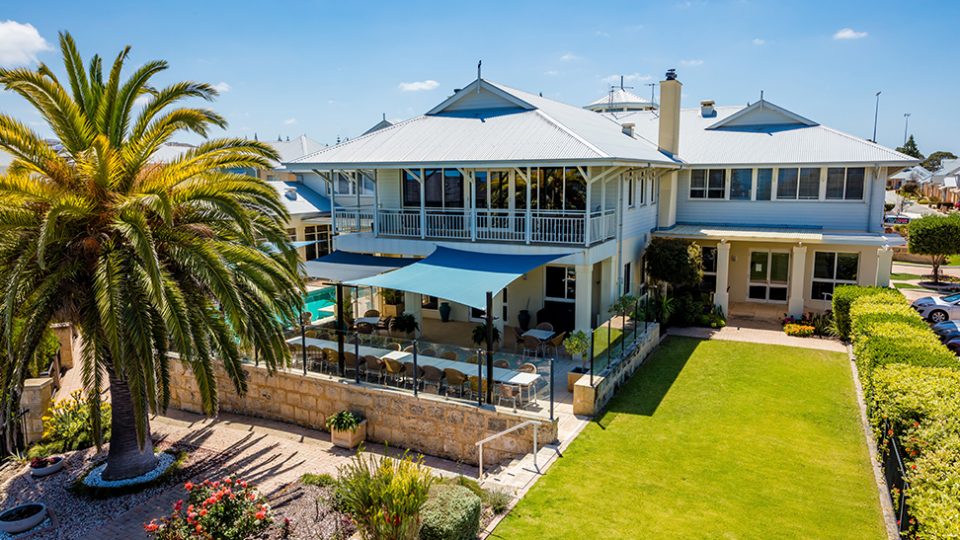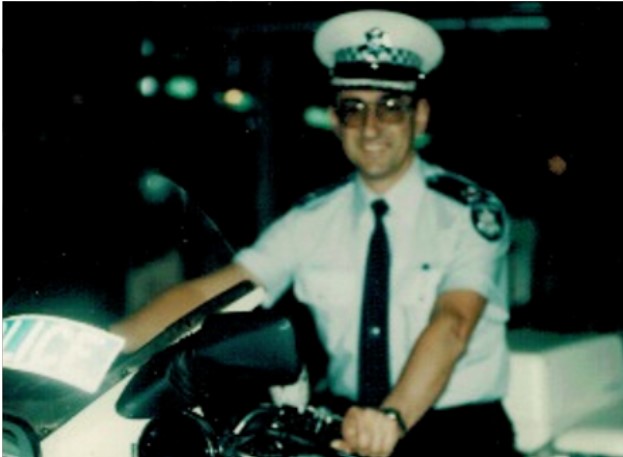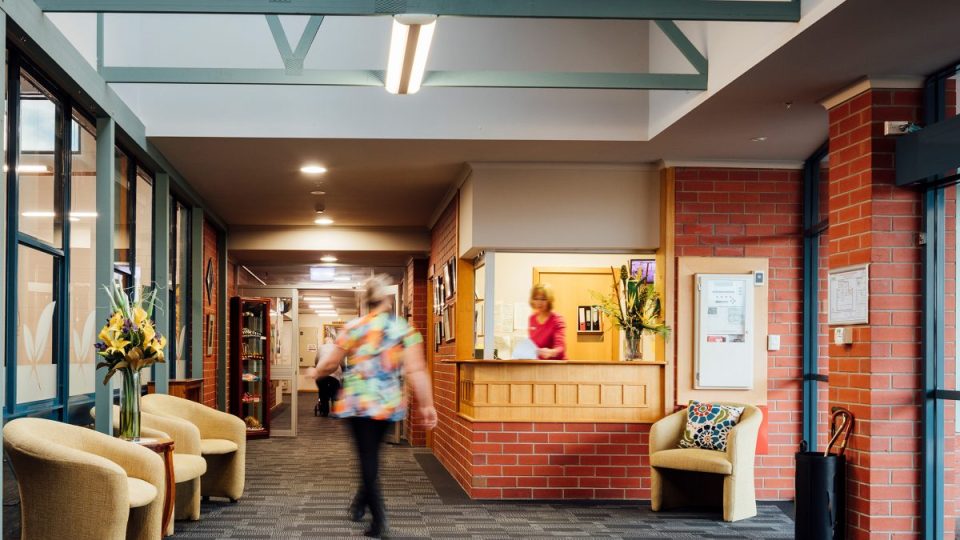Gwenda Sach remembers her mother on Founders Day
- 24 Feb 2022

Imagine this. You are the mother of six daughters, two of whom died in tragic circumstances. Your youngest child was born with palate and throat malformations and struggles to speak. You are living in Australia, on the opposite side of the globe to your own family in London. It is 1943, and the world is at war. Your husband, the family bread-winner, has just died unexpectedly. So what do you do?
If your name is Florence Sach, you lean on your Christian faith and Baptist heritage and put your energy into helping others.Florence was one of the big-hearted members of the Victorian Baptist Women’s Association which raised £4,481 to purchase Strathalan homestead in Macleod. It opened in 1945 as Strathalan Home for the Elderly, the first step in building the organisation now known as Baptcare.
This was a grassroots movement of passionate and compassionate women, not a top-down initiative. As Ken R. Manley wrote in From Woolloomooloo to ‘Eternity’: A History of Australian Baptists (Volume 2, 2006), “In Victoria, from the floor of a Baptist Assembly – not from any denominational master-plan – came a plea that the churches should establish a home for the elderly. Baptist women took the initiative. Mrs Mary Pope, wife of Revd W.G. Pope, was the leader…The Union Secretary was advised but it was the women who had been organized to gather in large numbers and ‘invaded’ the Assembly on 17 May [1944] and moved the proposal…the motion was ‘carried with acclamation’.”
As we prepare to celebrate Founders Day on 24 February, it was wonderful to have the opportunity to speak with Gwenda Sach, daughter of Florence, at Baptcare The Orchards Community. She shared the story of her mother, her family and the practical expression of faith that is the beating heart of Baptcare.
“I remember going to Strathalan with my mother in those early days,” Gwenda said. “It was a big building and there were a lot of women there engaged in different tasks. My mother was part of the original committee. It was a very busy time.”
The powerhouse who catalysed the energy of these committed Baptist women was Mary Pope. “She would circulate around the congregations, drumming up support for providing homes for the elderly. She was a vibrant leader, very energetic in helping women in their faith. She encouraged women to start counselling for older people. She was a great person, and was concerned for people not just physically but also spiritually.
“My mother was a good and wise woman. She had common sense and cared for people. You need people like that, and you also need leaders like Mary Pope. These were great days. There was a vibrancy, and a sense of a true Union of Baptist people. We also loved the Belgrave Heights Convention. My mother was a lovely, serving Christian woman and it meant everything to her to be within the church. It was her family out here in Australia.
“The story is unending. Mum was not a preacher, but one who lived her faith in the practical help of others alongside other women who knew the Lord. And we can still see that happening today.”
Florence started life in England where she was a member of Holmesdale Baptist Church in London. During the First World War she met a young soldier from Australia, Victor Sach, who had been serving in France and Belgium before being moved to England for Rest & Repatriation. “It was love at first sight,” Gwenda says. As she tells the story, Gwenda refers to her mother’s constant companion, a small red notebook in which Florence wrote Bible verses, pertinent points from Baptist meetings and family records.
After the war finished, Victor and Florence travelled together to Australia on a troop ship. She became part of Victor’s church family at George Street Baptist in Fitzroy. Later they spent five years in Middle Brighton, then settled in Bentleigh. Six daughters were born: Enid, Beryl, Phyllis, Doris, Joan and Gwenda.
The youngest child, born in 1935, had profound health challenges. “When they discovered I was born with both hard and soft palates cleft, they had to feed me by dripping milk down my throat from a tiny teaspoon,” Gwenda says. She underwent major surgery aged two and again at 14 and 28, followed by countless hours of dental work, orthodonture and speech therapy.
Does Gwenda complain? Of course not; she is Florence’s daughter, after all. “God’s been so good to me,” she says. “My whole life is a blessing from the Lord. He has been my life’s joy.”
Which doesn’t mean life was easy. “When I was eight years and four days old, my father died of TB Meningitis. I was in shock for a long time. Legacy stepped in and supported us. It was the war, and many families were finding things a struggle.”
Gwenda undertook secretarial studies, was influenced by legendary Baptist missionary figures including Rev J.D. Williams and Rev Dr Gilbert Macarthur, and in 1965 was selected for work in Papua New Guinea providing support to a Melbourne Bible Institute outreach project, Christian Leaders’ Training College. She spent six years there, stationed mainly in the remote highlands town of Banz. “Our conditions were very basic, western food had to be airdropped to us via Madang, but we had kerosene lamps and we loved the work.”
Florence Sach lived to almost 100 and spent her final years in Baptcare’s Karana community. Phyllis spent her final years at Baptcare’s Hedley Sutton, and Gwenda and her sister Joan made Baptcare Templestowe Village and then The Orchards their home. “Baptcare has been good to me,” Gwenda smiles. “And the Baptist church has brought me joy and fulfilment.”
Women like Gwenda and Florence are links in a long chain of service – women with a belief in mission and practical social action. This is the DNA of Baptcare, the founding story that can be drawn upon by all within the organisation as a source of strength and meaning. Baptcare staff continue to come face-to-face with social disadvantage and injustice in our communities. We can look at the example of the women who insisted on better care for older people at Strathalan in the 1940s, and be inspired to press forward with our own work in 2022. You can be sure that is what Mary Pope and Florence Sach would have wanted.
Community news
-

BaptistCare to acquire Keyton’s Western Australian retirement village portfolio
BaptistCare is pleased to announce that we have entered into an agreement to acquire Keyton’s portfolio of retirement villages in WA.
- 13 Nov 2025
-

Spotlight on Residents: Reg Baker
At Baptcare, we are always delighted to learn more about our residents’ lives. They are often filled with excitement, joy, and adventure, and it truly reminds us how rich a person’s life is—and continues to be—when they join one of our residential aged care communities. Today, we are honoured to share the remarkable story of one of our residents, Reg Baker, who lives at Baptcare Peninsula View Residential Aged Care community.
- 10 Nov 2025
-

Staff spotlight | Leonie Irvine – 35 years of service in aged care
Leonie is one of our dedicated Lifestyle Assistants at Karingal Residential Aged Care community in Devonport, Tasmania. She recently celebrated an incredible milestone - 35 years of continuous service at Baptcare. In a sector where long-term service is increasingly rare, Leonie’s 35-year journey stands out as something truly special.
- 10 Nov 2025
